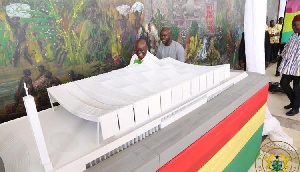 Architectural design of Ghana's national cathedral
Architectural design of Ghana's national cathedral
In a conversation with a relative well-versed in Ghana political history and also constitutional law, having retired from serving as an Assistant Attorney General of the state of Kentucky, I learned from him that pure jealousy or ignorance sometimes underlies many of the average Ghanaians’ never-ending criticisms or opposition to many of the policies or initiatives the government of the day seeks to pursue.
Specifically, our phone conversation was centered on the proposed construction of the national cathedral envisioned by President Akufo-Addo. The first question was why majority of Ghanaians with their boastful claim to Christianity seem to oppose the building of a national cathedral? The second concern was to understand if the president of the republic is acting within his constitutional powers to even contemplate, let alone attempts to build an interfaith edifice for the nation.
Regarding the latter question, my “good old lawyer” in Kentucky brilliantly argued that the Ghanaian Constitution provides the president with broad powers to do a lot of things, including the construction (if he wants to) of a “national cathedral” so long as that move does not promote a religion or infringe on the rights of any religious group.
So, the real question is, does constructing a national cathedral in the multi-religious society such as Ghana constitutes an infringement of the rights of any particular group of people or minority religious sects? The answer is NO! If that is the case, then, why are bunch of Ghanaians, including some of the so-called Christians among the vociferous pack opposed to the idea of national cathedral planned to be built not out of taxpayers’ money but from private funds?
As my historian/constitutional lawyer explained persuasively in our conversation, although numerous reasons may account for the opposition of President Akufo-Addo’s national cathedral initiative, no doubt many of the naysayers’ positions are driven by jealousy or ignorance that has seemingly become unshakeable part of Ghanaian sociocultural persona since independence.
Typically, Ghanaians are good talkers, complainers, opinionated almost about everything until it comes down to problem-solving, or when someone else wants to embark on something that is innovatively big, in which case some people will try the “pull-him-down” tactics out of sheer jealousy. Often, a lot of Ghanaians offer critiques or opinions about some policies as if those viewpoints are all in good faith, but a little scrutiny exposes the critics’ ulterior motives. For example, many Ghanaian political historians contend that if Dr. Kwame Nkrumah had given in to the cynics at the time, even the economic infrastructure like the Tema-Accra Motorway would not have been built, because there were fierce opposition to that vision.
Ghanaians will oppose everything and the same time want everything from the government. Some of the reasons given for opposing the national cathedral border on economic constraints as if abandoning the monument’s construction will suddenly add budget surplus to the nation’s fledgling economy or solves the carnage on Ghanaians’ roads, including the garbage drowning our neighbourhoods in Ghana.
Whenever one hears some group of Ghanaians ripping apart some of the government policies or ideas, they sound like they have answers to all the problems facing the country until one sees these very same all-knowing critics/people dumping trashes or urinating in the public or street corners where they live. Indeed, Ghanaians are walking contradictions, to say the least.
The Ghana Statistical Service in its report as captured in the 2010 Population and Housing Census, nearly 72% of the country’s population view themselves as Christians or have Christian faith while about 18% say they belong to the Islamic faith; the traditional religion accounts for a little over 5%, and what have you. Given this staggering fact, it is inexplicable why putting up an interdenominational national cathedral should elicit contentious opposition, even among those who profess Christian beliefs.
Our Muslim brothers and sisters would never have a problem like their indecisive Ghanaian Christians are noted for, given the same sets of circumstances. Imagine Ghana as predominantly Muslim nation, there is no way we will not have a national Mosque constructed; and, that scenario wouldn’t be a big deal. As indicated, in democracy, the majority rules as long as the minority right is sacredly protected. In other words, building an interfaith cathedral by a Christian president is not in any way an attempt to supplant the faiths of the religious minorities. It will be a suicidal for any Ghanaian leader to go that religious route. Certainly, that is never the intentions of Nana Addo Danquah to promote one religion over the other.
At any rate, Ghana’s constitutional democracy is a child’s play compared to the United States. Way back in the 1700s, the US Constitution explicitly states in the Bill of Rights that the government “shall make no law respecting an establishment of [state] religion,” or prevents any American citizen from freely exercising any religion of their choice (First Amendment Law). Simply stated, the US Constitution clearly mandates the separation between church/religion and state. Yet, US has national cathedral in the capital city of DC. The British have it, too.
Reflecting on the significance of the national cathedral in US, the Very Rev. Samuel Lloyd III, a former head of the cathedral, once explained the interfaith landmark in a simplest way possible: “A sacred place to celebrate events that have shaped our country [United States], to mourn in times of loss, and to address the pressing moral and social issues of the day.” Like the proposed Ghanaian version, the national cathedral in the US capital is not necessarily a place of “worship” for Christians per se, but it is modeled to be the “spiritual home for the nation” regardless of one’s religious faith. In Ghana, many important policies and programs can’t be accomplished because of jealousy, ignorance, or “if-l-can’t-do-it-then-l-won’t-let-you-do-it” mentality is the driving force behind many of our sociopolitical discourse.